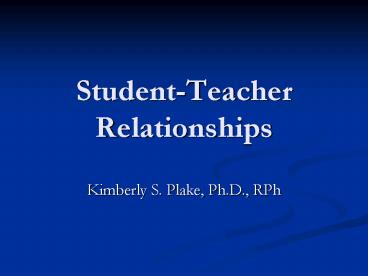StudentTeacher Relationships - PowerPoint PPT Presentation
1 / 17
Title:
StudentTeacher Relationships
Description:
Explain the importance of developing student rapport in the ... Tell ethnic, racist, or sexist jokes. Give exams or quizzes during the last week of semester ... – PowerPoint PPT presentation
Number of Views:6729
Avg rating:3.0/5.0
Title: StudentTeacher Relationships
1
Student-Teacher Relationships
- Kimberly S. Plake, Ph.D., RPh
2
Objectives
- Explain the importance of developing student
rapport in the terms of classroom management,
incivility, and academic dishonesty. - Identify examples of incivility and suggest
methods to address such occurrences. - Describe methods that can be used to prevent
incivility and academic dishonesty.
3
- Think about favorite teachers in your past
- What made them your favorite?
- Why were they effective?
- Now think about your least favorite teachers
- Why were they not your favorites?
4
What kind of teacher are you?
- I bring to teaching a belief .
- In the classroom, I see myself as .
- I believe students are .
- I seek to foster in students .
- I think learning is .
5
Common Student Complaints
- Are not in offices during office hours
- Insult, humiliate, or are rude
- Unprepared
- Do not know subject matter
- Exhibit a negative attitude about a course
- Do not return tests or assignments promptly
- Add extra assignments or require additional
courses materials not listed in the syllabus - Selectively extend assignment deadlines
6
Common Student Complaints
- Show favoritism
- Are not honest
- Are impatient, defensive or angry when asked
questions - Tell ethnic, racist, or sexist jokes
- Give exams or quizzes during the last week of
semester - Are unapproachable or unhelpful
- Exhibit intellectual arrogance
7
Building Rapport
- Go to classroom early and leave late
- Great the class
- Get to know your students
- Let your personality and interests come through
- Use your students names in ways that build
self-esteem - Encourage faculty-student contact inside-outside
of class - Use humor to create an informal atmosphere
- Observe and listen
8
The First Day
- Goals
- Create a positive classroom experience
- Begin to build a sense of community or belonging
- Introduce self
- Ask student to complete an introduction card
- Begin to learn students names
- Give students an opportunity to meet each other
9
- What are some examples of incivility that you
have seen or experienced?
10
- Why does incivility occur?
- What are some of the causes?
11
Impact of Incivility
- Faculty
- Lose confidence in teaching
- Become indifferent to the classroom
- Fear for personal safety
- Students
- Decreased student participation and involvement
in class - Lose desire to learn
- Lose confidence in academic abilities
- Fear for personal safety
12
Prevention
- Set expectations
- Reduce anonymity of students
- Be trustworthy
- Model civil behavior
- Reflect on classroom or lecture series
- Address disruptive behavior when it happens
13
Addressing Incivility
- One or more students talking
- A student who falls asleep
- A student who is doing unrelated work
- A disruptive student
- A student who is angry or aggressive
- A student with excuses
- An unprepared student
14
Academic Dishonesty
- Dishonesty in connection with any University
activity, such as cheating, plagiarism, or
knowingly furnishing false information. - Knowingly to aid and abet, directly or indirectly
other parties in committing dishonesty acts is in
itself dishonest. - What are some examples?
15
Prevention
- Create an environment that promotes academic
integrity - Set expectations (including what constitutes a
violation) - Include statement on syllabus
- Establish consequences
- Have students sign an academic honor code
- Have class discussion on academic dishonesty
topics (e.g., plagiarism) - Use multiple methods of assessment
- Establish testing procedures
- Use colored ink
- Mark lines through incorrect answers
16
What if dishonesty occurs?
- Collect evidence and document
- Use consequences that were established
- Consult with Office and Dean of Students
17
References
- Davis, BG. 2001. Tools for Teaching. San
Francisco, CA Jossey-Bass. - Filine, P. 2005. The Joy of Teaching. Chapel
Hill, NC The University of North Carolina Press. - McGlynn, AP. 2001. Successful Beginnings for
College Teaching. Madison, WI Atwood
Publishing. - McKeachie, WL. 2002. Teaching Tips, 11th
edition. Boston, MA Houghton Mifflin Company.































